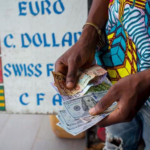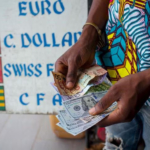
Ghana’s cumulative foreign exchange interventions since the peak of the economic crisis in 2022 have crossed $7.4 billion, according to IMF data tracked by JoyNews Research.
The data show that the Bank of Ghana intervened in the forex market with about $1.9 billion during the crisis year of 2022, before easing its interventions to $1.1 billion in 2023. The Central Bank then ramped up its support significantly to $3 billion in 2024, followed by an additional $1.4 billion in just the first quarter of 2025 alone.
Earlier this month, the Bank of Ghana announced plans to inject $1.15 billion under its Domestic Gold Purchase Programme (DGPP), reflecting a sustained effort by the Central Bank to stabilize the local currency amid persistent external pressures.
This decision could catapult total forex injections for this year alone to over $2. billion. The forex, according to the apex bank, will be disbursed through twice-weekly, price-competitive spot auctions open to all licensed banks.
Following the announcement, the cedi has appreciated by some 2.5%, signaling a possible renewed investor confidence in the Central Bank’s strategy, with investors tipping the local currency to put on some weight against the US greenback in the final quarter of 2025.
The expectation is that firm dollar demand from the energy, services, and manufacturing sectors, largely seen in the third quarter of the year, could be offset by offshore FX inflows and a liquid local interbank market.
Dollar interventions have seen a dramatic surge in the last two fiscal years, accounting for more than 60% of the total amount pumped into the market over the past four years.
This heavy injection of foreign currency has underpinned one of the strongest performances of the Ghana cedi in recent history.
According to the World Bank 2025 Africa Pulse Report, the cedi was the best-performing African currency against the U.S. dollar during the first eight months of 2025, appreciating by more than 20% year-to-date.
This remarkable run is largely attributed to the Bank of Ghana’s aggressive forex interventions, complemented by rising export earnings from gold and cocoa, and strong remittance inflows.
Data tracked by JoyNews Research indicates that with this latest round of support, total forex interventions since 2022 could reach about $8.6 billion. The Bank attributes this year’s interventions to robust inflows from gold and cocoa exports and steady remittance receipts.
Gold has been a key lifeline for Ghana’s external sector. Prices have soared to an all-time high of $4,000 per ounce this week, strengthening the Bank of Ghana’s ability to generate foreign exchange without excessively depleting its reserves.
The country is projected to maintain its position as Africa’s top gold exporter, with export revenues expected to exceed $15 billion by year-end, accounting for roughly 65% of Ghana’s total export inflows.
This windfall has provided the Central Bank with the “forex muscle” to sustain market interventions while maintaining a healthy reserve buffer. According to the IMF’s latest Staff-Level Approval report, “in collaboration with the Fund, the BoG has developed a structured foreign exchange operations framework to intermediate FX flows and smooth excessive market volatility, while accumulating international reserves.”
Ghana’s international reserves have now surpassed $10.7 billion, providing about 4.5 months of import cover. The IMF further noted that “international reserves accumulation continues to exceed the ECF-supported program targets, while the cedi appreciated markedly in the first half of the year.”
Historical data show that most of the Central Bank’s interventions tend to occur in the latter part of the year. In 2024, for instance, about 67% of the $3 billion forex injections took place during the last four months, coinciding with the election period.
While these consistent interventions have provided short-term stability, they also raise important long-term questions. How sustainable is Ghana’s reliance on gold-backed forex interventions to defend the cedi?
The worry is that the continued dependence on commodity exports for currency support may expose the economy to volatility in global prices, signaling the need for a more diversified and resilient foreign exchange generation framework.
For now, the Bank of Ghana’s decisive actions have earned the cedi a rare moment of strength, but sustaining that momentum will depend on how effectively the country converts its export windfall, especially from gold, into structural stability.
About the writer:
Who is Isaac Kofi Agyei:
Isaac Kofi Agyei is a Data & Research Journalist/Analyst at JoyNews based in Accra, where he covers mostly finance, economics, banking, and politics across Ghana and West Africa, from detailed analytical reports on all key issues to debt crises to IMF programmes. He also serves as the data and research correspondent for SBM Intelligence, an Africa-focused market/security leader in strategic research, providing actionable analyses of West Africa’s socio-political and economic landscape. With his solid academic background in economics and statistics and additional training from credible institutions such as the UNDP, Afrobarometr, Ghana Statistical Service, and a host of others, Isaac has honed his skills in effective data storytelling, reporting, and analysis.
- President Commissions 36.5 Million Dollars Hospital In The Tain District
- You Will Not Go Free For Killing An Hard Working MP – Akufo-Addo To MP’s Killer
- I Will Lead You To Victory – Ato Forson Assures NDC Supporters
Visit Our Social Media for More




